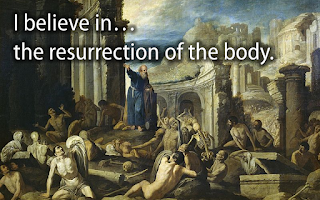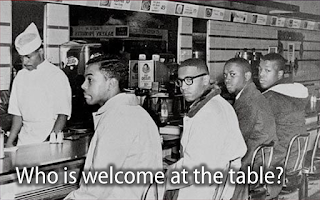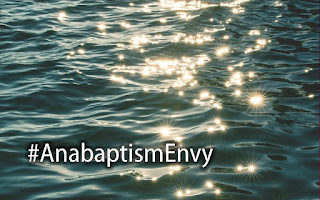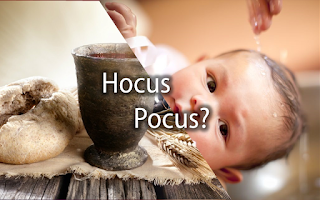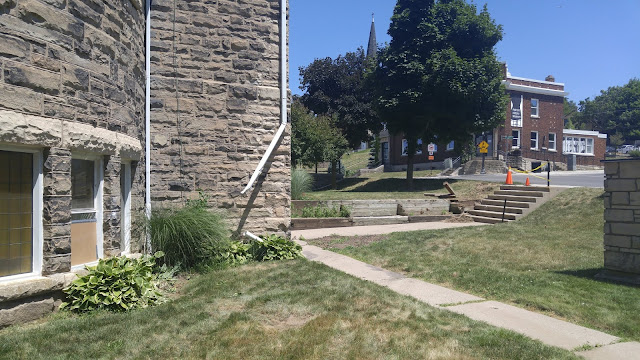Hespeler, 2 September, 2018 © Scott McAndless
Isaiah 11:1-9, 1 Corinthians 15:12-26, Psalm 7:1-11
| I |
can’t be the only one to notice, am I? The world is kind of a mess. I mean, all kinds of things are just falling apart. Political alliances like NATO and the United Nations – organizations that maintained an unprecedented ( if imperfect) global peace for decades have fallen on hard times. Russia, in particular, seems to be hard at work destroying some of our most cherished institutions like democracy. North Korea is clearly working as hard as ever at creating weapons of mass destruction and putting them in missiles that go ever further.
And that is just the global political situation. Look at the environmental situation. Even if we somehow manage to avoid blowing up the planet with some weapon or other, that hardly seems to matter because our collective action seems to be destroying the environment and even changing global climate patterns.
I could go on but you get the point. We seem to have all kinds of reasons to despair for the future these days. It is honestly getting to the point where I am actively avoiding certain kinds of news stories. I don’t remember ever doing that before.
But that is okay, right? I mean, we’re Christians, aren’t we? And I have been told often enough that Christians don’t really have to worry about the long-term future of this world because it is not our destiny. We ultimately belong to another world because someday, when we die, our bodies will decay and remain in this world but our souls will live on in another, better place. So why would we worry about this world? In fact, would it not be a good and very Christian approach to life to totally forget this world, its needs and its future? “The world is not my home, I’m just passing through.” So why not just take whatever you can from the earth – plunder the forests, the seas, the depths of the earth – because our future is not here.
I will admit that that is exactly how some Christians do approach life and often how outsiders assume that all Christians think. But I think that most of us would say that it doesn’t sound quite right and indeed it isn’t. But why not?
The Bible does promise us that we have the hope and promise of an afterlife. Because of Jesus – because of what Jesus has accomplished for us in his death and resurrection – we can look forward to a life beyond this present existence. I believe that and I know that many of you do too, but how are we supposed to reconcile that with a commitment to this present world. We have two questions from the catechism this morning. The first focuses on our hope for a life beyond the present life by talking of our belief in the resurrection of the dead. But the next question asks about hope and the hope that it talks about is very clearly talking about hope for this present world. “We hope for a transformed world in which justice will roll down like waters and righteousness like an ever-flowing stream.” So which is it? Are we supposed to have hope for this world or just for the next?
Well, we are not the first Christians to wonder that. The Christians in Corinth were dealing with very similar questions shortly after that church was founded by the Apostle Paul. It was not easy to be a Christian living in Corinth in those days. It usually meant cutting yourself off from your family and from just about everything else. So things were tough for those Christians and they started to give up on this world and many began to think that their only hope was to be found in the next.
How do we know this? Because of how Paul wrote to them in order to correct them. He asks them an odd question in our reading this morning: “Now if Christ is proclaimed as raised from the dead, how can some of you say there is no resurrection of the dead?” Now how can that be? How can a group of Christians, who have heard and clearly believe that Jesus was raised from the dead, possibly not believe in a life after death? It doesn’t make any sense.
But here is what is going on. It seems clear that those Corinthian Christians did believe in the afterlife. Everything that Paul writes to them in this letter takes that for granted. Paul is not correcting them for failing to believe in life after death but rather for the way in which they are conceiving of that life. Rather than believing in the resurrection of the body, they believe in the immortality of the soul.
This is not all that surprising, really, because most of the Christians in Corinth were Greeks and the immortality of the soul was a very Greek way of thinking about life after death. It was the Greek Philosophers, especially the great teacher Plato, who first proposed the idea that there was, within the human person, some spark of the divine – a soul – that was, in its very nature, immortal. The body could die and it would decay away, but the soul would live forever.
Now that is an idea that probably makes sense to many of us, because that is how we generally think about the afterlife as well. I don’t know how many times I have been there at a funeral and seen people look down at the body of their loved one and say, “They are not here anymore, but their soul will live on in another, better place.” The immortality of the soul is our go-to way of talking about life after death.
But what Paul is pointing out to the Christians in Corinth is that that is not exactly what he taught them when he preached the gospel to them. He didn’t promise the immortality of the soul, he promised the resurrection of the body. He preached that their hope for life after death was found in the fact the God had raised Jesus’ body from the dead. The promise was that since God had done this for Jesus, he would surely do it for them as well.
So, in this letter, Paul is correcting them for falling back into the Greek way of thinking about the afterlife and so denying the gospel that he had preached to them which was based on God’s power to raise the dead.
Now I will admit that there is a part of me that wonders why Paul is so concerned about this distinction. We are talking about the afterlife here and, while the New Testament promises of a life after death are clear, I do not believe that the Bible gives us anything like a clear description of what that life will be like. I do not believe that human language has words that could possibly describe what such an existence shall be like. I mean, consider the descriptions that are offered. One passage speaks of streets paved with gold. A lovely image, of course, but it hardly seems like a very good practical or literal description. Do you think that driving on ice is bad? Imagine driving on a street paved with gold?
No, instead of literal descriptions of the afterlife, what we have in the Bible are images and metaphors. No one can tell us that it is this or that, we can only say that it is kind of like this or kind of like that. And concepts of the immortality of the soul or the resurrection of the body are the same thing – they are simply images that are meant to give us some idea of what that existence will be like.
So why is Paul so insistent that they must speak of the afterlife in one particular way? It is not that they are wrong. The immortality of the soul is a helpful way to conceive of life after death. But he was commending to them a better way to think about it. But why? What is so much better if you think in terms of the resurrection of the body?
One part of the answer, as far as Paul is concerned, is that talking in terms of the resurrection of the dead reminds us how we have access to that other life. It is a reminder that we have gained access to the life beyond because of Jesus and especially because of what he has accomplished for us in his life and death and resurrection. It is a reminder that we will be raised because Jesus was raised. And that part of the answer is what Paul particularly focuses on in our reading this morning from his Letter to the Corinthians.
But there is also another reason why Paul stresses the idea of the resurrection of the dead and it takes us to the heart of the issue that we have been talking about. If you only think of the afterlife in terms of the immortality of the soul, you will naturally tend to devalue the things of this world. After all, your body and all of the physical things that it depends on will pass away. They will turn to dust while your soul lives on through eternity. This makes it easy to assume that the eternal thing is the only thing about you that is important and that the passing things of this world matter not at all. I would say that the idea of the immorality of the soul is one of the key reasons why Christians have developed a bit of a bad reputation for being quite willing to let this world be destroyed because it is all only so much dust.
But if you learn to think of the afterlife in terms of the resurrection of the body, you cannot think in such terms. Quite simply, such an idea of the afterlife means that the body and the things that sustain the body matter. They matter because God made them in the first place. And precisely because God made them in the first place, God can make them again even after death.
Now I realize that thinking of the afterlife in terms of the resurrection of the body creates problems and quandaries for us. If our hope is for a resurrected body, well then what will that body be like? Which body will I get after I die? The strong and healthy one that I had when I was eighteen years old or the old and broken down one that I had when I died in my eighties? And what about those whose bodies are destroyed or cremated or eaten by sharks in the sea? Does that mean that they have lost all hope of the afterlife?
But these questions all miss the point of the idea and the point that Paul is trying to get across. As I said, no one can really say what the life beyond the grave is like. We have not the language to describe it. The resurrection of the dead is not a literal description of what that life is like, it is a helpful metaphor to help us wrap our heads around the meaning of that existence.
But Paul encourages you to think of it that way for some very good reasons. It is to remind you that your hope for life after death is found in God (and not in some inherent nature of your soul). The God who created you and the God who raised Jesus Christ from the dead is quite capable of raising you as well as giving you a body that you cannot understand now but that fulfills all of your hopes. It is a reminder that, when you die, you will be in the hands of a loving and benevolent God and that is a good and comforting thing.
But secondly, and I think more importantly, it is there to teach us that our hope is not merely for another world beyond this one. We need not and must not wait to find hope. To work for justice, for what is right and good in this world is not only possible, it is an essential part of being a follower of Christ Jesus, the resurrected one.
